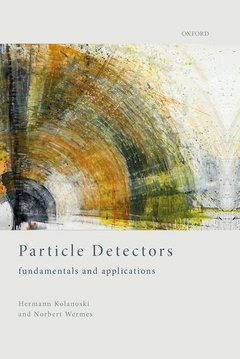Description
Particle Detectors
Fundamentals and Applications
Authors: Kolanoski Hermann, Wermes Norbert
Language: English
Subjects for Particle Detectors:
115.29 €
In Print (Delivery period: 21 days).
Add to cart
Publication date: 06-2020
950 p. · 17.8x24.8 cm · Hardback
950 p. · 17.8x24.8 cm · Hardback
Description
/li>Biography
/li>
This book describes the fundamentals of particle detectors as well as their applications. Detector development is an important part of nuclear, particle and astroparticle physics, and through its applications in radiation imaging, it paves the way for advancements in the biomedical and materials sciences. Knowledge in detector physics is one of the required skills of an experimental physicist in these fields. The breadth of knowledge required for detector development comprises many areas of physics and technology, starting from interactions of particles with matter, gas- and solid-state physics, over charge transport and signal development, to elements of microelectronics. The book's aim is to describe the fundamentals of detectors and their different variants and implementations as clearly as possible and as deeply as needed for a thorough understanding. While this comprehensive opus contains all the materials taught in experimental particle physics lectures or modules addressing detector physics at the Master's level, it also goes well beyond these basic requirements. This is an essential text for students who want to deepen their knowledge in this field. It is also a highly useful guide for lecturers and scientists looking for a starting point for detector development work.
Hermann Kolanoski is Emeritus Professor of Physics at the Humboldt University Berlin and at the research centre DESY (Zeuthen). After having received his doctoral degree in Bonn he worked at universities in Stanford, Bonn and Dortmund before joining Humboldt University in 1995. His field of expertise is experimental particle and astroparticle physics. He currently participates in research with the IceCube Observatory at the South Pole and ATLAS at CERN. His work in detector development includes gaseous wire chambers, calorimeters, photon detectors, and trigger electronics as well as applications in medical physics. Norbert Wermes is Professor of Physics at the University of Bonn. His field of research is experimental particle physics and detector physics. He has conducted research with experiments at the particle physics research centres DESY (Hamburg), SLAC (Stanford), Fermilab (Chicago), KEK (Tsukuba), and CERN (Geneva). After graduating with a PhD in physics from the University of Bonn, he was a postdoc at Stanford University, and a CERN staff scientist. In 1989 he became a professor at the University of Heidelberg, before returning to Bonn in 1992. With his group, he currently carries out research with the experiments ATLAS (CERN) and Belle II (KEK). In detector physics, his focus is on semiconductor pixel detectors and microelectronics.
© 2024 LAVOISIER S.A.S.
These books may interest you

Particle Physics and the UniverseProceedings of the 9th Adriatic meeting, Sept. 2003, Dubrovnik 210.99 €



